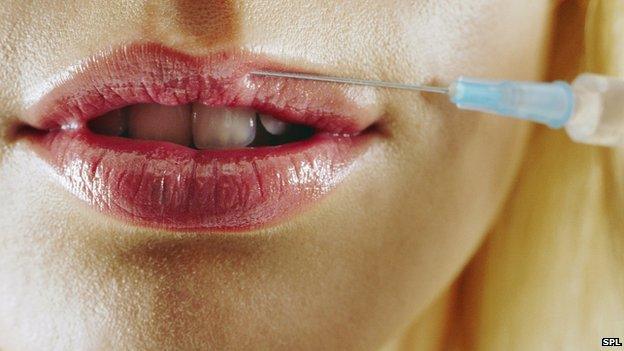Doctors' cosmetic surgery guidance urges more honesty
- Published

The GMC wants doctors doing cosmetic surgery to be more open and honest with their patients
Doctors who carry out cosmetic procedures should give patients time to think before agreeing to go ahead, new guidance says.
The General Medical Council has produced the guidance to make surgical and non-surgical procedures, such as facelifts, breast implants, dermal fillers and Botox, safer.
It will now consult doctors and the public about the guidance.
Plastic surgeons said they were already using a two-week cooling-off period.
In 2013, a report by NHS England's medical director highlighted the risks associated with the cosmetic sector.
This followed safety concerns after nearly 50,000 women in the UK had PIP breast implants fitted. The French implants were made from an unauthorised silicone filler and were found to have double the rupture rate of other implants.
In January, the Royal College of Surgeons published a consultation on proposals to improve standards in cosmetic surgery.
The GMC sets the standards that are expected of all UK doctors who carry out cosmetic procedures. It also tries to help patients understand what to expect from their doctor.
Some of the main points in the new guidance say that doctors should:
Be open and honest with patients and not trivialise the risks involved
Give patients enough time and information before they decide whether to have a cosmetic procedure, allowing them time to "cool off"
Ask patients to tell them how they have been affected by a cosmetic procedure, both physically and psychologically
Not target people under 18 through their marketing and seek additional advice from professionals who treat young people
Seek their patient's consent themselves rather than delegate it
Not make unjustifiable claims about the results they can achieve and not give away procedures as prizes
Prof Terence Stephenson, the chairman of the General Medical Council, said some patients in this area were vulnerable and needed protecting.
"We are clear that doctors must not pressure patients to make rushed decisions they may end up regretting and they must give them enough information so they can make an informed choice."
Sales tactics from other industries like 'buy one get one free' are not appropriate for cosmetic surgery, says the GMC
Rajiv Grover, consultant plastic surgeon and former President of the British Association of Aesthetic Plastic Surgeons (Baaps), welcomed the GMC's guidance because he said some patients were psychologically unsuitable for cosmetic surgery.
"Cosmetic surgery has for too long been seen as a commodity but unfortunately once an operation is done - it can't be taken back to the shop."
He said Baaps had insisted on a two-week cooling-off period for many years and also encouraged a second consultation with a surgeon before a decision was made.
The association is looking into developing a screening tool to help identify patients who should not have surgery.
The final GMC guidance is expected to be published in early 2016.
- Published23 January 2015
